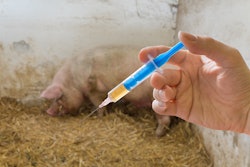
The sudden rapid spread of the African swine fever (ASF) virus in domestic pigs has prompted an offer of financial support to affected owners from the authorities in Croatia and Bosnia and Herzegovina. Outbreak totals are also rising in other Balkans countries and eastern European states, affecting mainly small backyard herds.
Within a couple of days at the end of June, Bosnia and Herzegovina and Croatia registered their first ever cases of the diseases. By mid-July, ASF virus was detected for the first time in Kosovo.
In Bosnia and Herzegovina, latest reports put the number of confirmed outbreaks at 182. Directly impacted have been around 7,200 pigs through mortality or culling. These figures are according to official notifications to the World Organisation for Animal Health (WOAH), and cover the period June 21 to July 17.
More than 130 of the affected farms are clustered in the north and northeast of the country in the Republic of Srpska. Meanwhile, cases have now also been reported in Posavina, which is a canton located in the other major region, the Federation of Bosnia and Herzegovina.
Furthermore, the country’s first case has been confirmed in a wild boar. This was found in its third region, the district of Brcko, which is also in the northeast.
To support Bosnia and Herzegovina’s pig owners through these outbreaks, the government of the Republic of Srpska has approved BAM2 million (US$1.13 million) for compensation payments.
According to Sarajevo Times last week, this will help purchase healthy pigs from threatened and infected areas. As well as supporting the owners from the economic loss, the move will help maintain pork supplies. In this way, the owner will receive half of the estimated value of the pig from the government, and half from the purchasing processor.
Previously, the same source previously reported that the ASF virus appeared to be spreading out of control. In the Republic of Srpska municipality of Bijeljina, a state of emergency was declared because of the disease.
Already by July 15, 5,080 pigs had been euthanized, and farmers were reported to be in panic as estimated losses passed BAM1 million.
In Croatia, the government has allocated EUR7.5 million (US$8.3 million) for the control of ASF, reports SeeNews. These funds will be used to support farmers whose businesses are impacted by the disease.
ASF developments elsewhere in the Balkans
Last week, the veterinary authority of Bulgaria reported the return of the disease after a 24-month hiatus.
Found to be infected was a single pig at a premises in Montana, according to the WOAH notification. It is the first ever ASF case in Montana, which is a province in the northwest, and the location appears to be near to the border with Romania. Source of this infection is unknown.
Meanwhile, Croatia’s total outbreaks has risen to 77, with a further 33 outbreaks recently registered with WOAH.
This includes a second confirmed infection in a wild boar, which was found in the western county of Karlovacka.
Directly impacting a total of 1,638 animals, all the other outbreaks have occurred in one of two counties in the east of Croatia —Vukovar-Srijem and Brod-Posavina. Most have occurred in a cluster, and in small backyard herds. Three of the latest outbreaks have affected farms with more than 100 pigs, with the largest herd numbering 272 animals.
Further information has been reported about the only ASF outbreak confirmed so far in Kosovo. Testing positive for the virus was a herd of 22 pigs on a family farm, reported KOHA last week.
Additionally, over the period July 13-19, 55 further outbreaks in domestic pigs were reported by the authorities in Serbia, and two in North Macedonia. This was according to the latest weekly update from the Animal Disease Information System of the European Commission (EC).
More outbreaks in domestic pigs in eastern Europe
According to the EC’s System, ASF was detected in 63 more Romanian pig herds during that week of mid-July alone.
Three latest reports to WOAH cover 10 outbreaks over roughly the same period. Directly impacted were around 90 pigs in total.
Bringing the nation’s total outbreaks in this population so far this year to 15, Poland’s veterinary agency has registered a further three outbreaks to WOAH. With affected herds of eight, 166 and 2,032 animals, two of the affected premises were in the eastern province of Lublin, and one in neighboring Masovia.
Meanwhile, the Polish chief veterinary office has reported a 16th outbreak in 2023. Impacted were 222 pigs, also in Masovia.
Registering three further outbreaks on pig farms with WOAH was Latvia. These bring the nation’s total outbreaks in swine so far this year to four. Affected have been a total of 199 animals.
To WOAH, Ukraine has confirmed two further ASF outbreaks affecting small backyard herds in the north of the country. One was in the Kiev region, and one in adjacent Chernihiv.
In Russia, presence of the ASF virus has been detected at two non-commercial premises with swine in Vladimir — an oblast in the Central district — and one in Nizhny Novgorod in the Volga district.
Further cases in wild boar across Europe
Over the past week, 10 European states have notified WOAH about new cases of ASF in their respective wild boar populations.
Registering the most outbreaks over this period were Poland (61 cases), Latvia (53) and Italy (18).
As well as the developments already reported in Bosnia and Herzegovina and Croatia, further cases were registered with WOAH by Hungary, Latvia, North Macedonia, Poland, Russia and Ukraine.
The weekly update from the EC also includes additional outbreaks in this population in Estonia, Germany, Lithuania, Serbia and Slovakia.
View our continuing coverage of the global African swine fever situation.
















